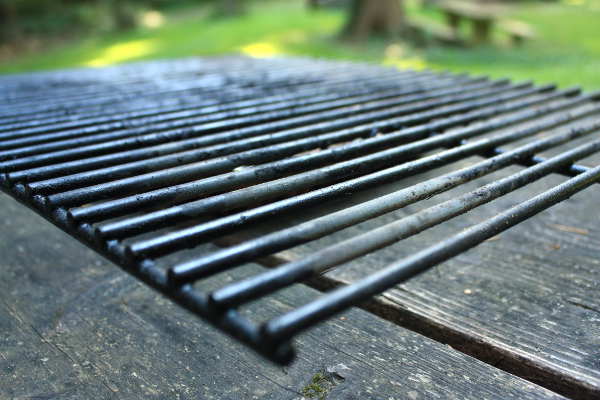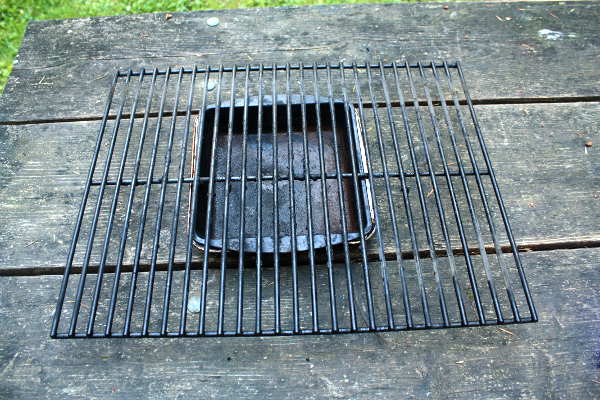Porcelain Cooking Grates, Care and Cleaning
The benefits porcelain cooking grates offer are easy cleanup, and a rust-free cooking surface. You'll also find that food doesn't stick to the grate to badly. With the benefits comes the need for special care. You just can't treat these like any old cooking grate when it's time to clean up.
 A Dirty Porcelain Grill Grate
A Dirty Porcelain Grill GrateThe porcelain coating can be bonded to one of two different materials...steel or cast iron.
The grates with a steel core are less expensive. They also retain less heat, so they don't perform as well when high-temperature searing steaks and seafood.
Porcelain coated cast iron grates have the grilling qualities of the cast iron core, with the convenience of the easily cleaned porcelain finish. Although more expensive than the steel core grates, the extra cost is worth it if you like to see those pretty grill marks on your barbecued foods.
The best quality porcelain grates have wide, heavy crossbars with narrow spaces in between. The heavier the inner metal core, the more heat the grate will hold, which translates into better quality grilled foods.
When cleaning porcelain cooking grates special care must be taken. Even though the porcelain is a very hard material, it can be easily damaged if handled incorrectly. The following tips will help you get a long life from the porcelain coating.
Cleaning Porcelain Grates

Clean your grates after each cookout for the best results.
-
The basic rule with porcelain is to treat it gently. The material is very brittle. Banging it around, hitting it with metal utensils or other hard objects, and flexing are a few things that should be avoided.
-
Carefully remove the grate from your grill or smoker. Have a dedicated piece of plywood available to work on. The wood surface is forgiving. Working on a concrete surface would quickly damage the porcelain.
-
Using a wash cloth with hot water and dish soap, scrub the grease and food particles off as best you can. If cleaned regularly, most of the residue will come off easily. High temperature grilling will cause the food to adhere more tightly. If this is the case, soak a large towel in the hot water and lay it over the grate. Let it sit for a half-hour or so, then scrub it with the wash cloth.
-
If the wash cloth didn't remove all the grunge, now use a plastic mesh scrubber with the soapy water. Don't get a scrubber that has abrasive cleanser in it. Harsh, abrasive cleansers will scuff up the porcelain, wearing it off. It will also destroy the non-stick properties. A mild cleanser like BarKeeper's Friend used on the plastic scrubber will remove the rest of the cooked on food.
- Rinse the grate with clean water, then dry it with a clean towel. Place it back into your grill.
Before heating up the grill for the next cookout, spray the top surface with a good quality cooking spray, preferably one made for use with grills. Another way to oil the grate is to grip a wad of paper towels in you tongs, dip it in vegetable oil and wipe it on.
Treat your porcelain cooking grates with care and they will provide you with great performance and a long life.
- You Are Here: Home >
- Tips >
- Care of Porcelain Cooking Grates
